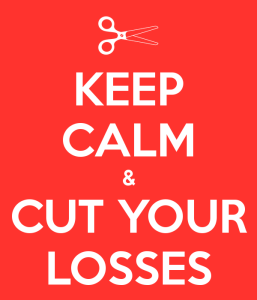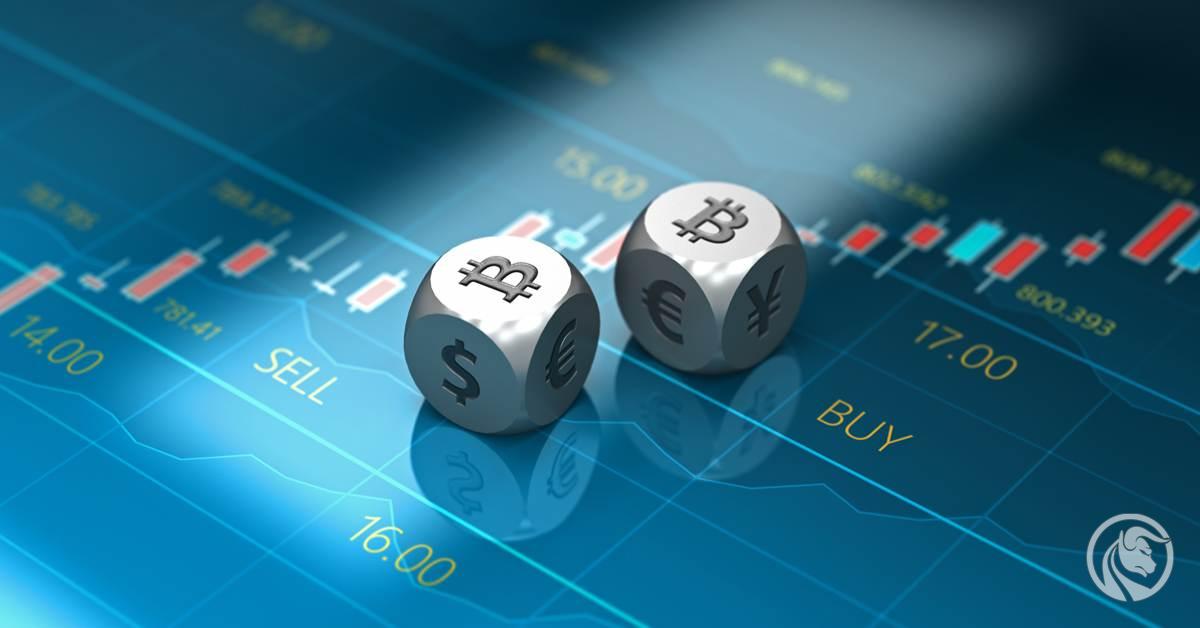How to deal with a bad run in trading?
Sooner or later each of us touches the moment when we begin to wonder if trading forex is even for us. Such reflection usually comes after a series of losses and frustrating attempts to quickly save the situation, which ends with another breaking the bill. We usually act irrationally, overstating our position and acting against all logic. Is there any effective method to prevent this? It seems to me that there is no one way that would take away the "fate" of losses from us.
We have already written a bit about the approach to losing in the article on the internalisation of losses. Today, however, we will focus on several issues that may help to grasp the recent failures and normalize our trading again. At the beginning I would like to point out that not every given example and not every presented method must have a perfect translation into our reality. Each trading system (even if it is used by crowds of people) is a unique way of making decisions (including psychological ones). Given this uniqueness, there is no guarantee that the aids we provide will be fully effective. However, they force you to deeper analysis of your own trading, which we strongly encourage.
Forex trading - boredom is the key
Often from the lips of earning traders we can hear that their trade is simply boring. This is not tantamount to depriving you of interest in the markets or losing passion. He lacks emotionality. Trading is becoming a money making tool in which loss is treated as part of the business. The perception of trading on forex or other financial market like having a business gives us some space in understanding the essence of quickly getting rid of losses. As the owner of the company, we would certainly try to reduce costs so that the potential income is as high as possible. Let's try to translate the same reasoning into trading.
D why should the trading activity be boring but interesting? Anything that evokes extreme emotions in us - enthusiasm when making profits and nervousness about losing capital, is comparable to gambling. Their task is to provide us with entertainment, sometimes associated with recording significant losses. It's extremely hard to get over your emotionality in trading. They accompany us in every sphere of life and nobody wants to become a feeling-free robot. When you are bored with trading and calm down all external factors, it is extremely important to acquire the ability to concentrate. Every day we do not realize that the phone, messages, data, conversations with friends, partner, boss or parents determine our mood (and not only them). For some, it may be impossible to focus in an environment where something is going on around us all the time. Maybe it is worth looking for a place favorable to trading?
why should the trading activity be boring but interesting? Anything that evokes extreme emotions in us - enthusiasm when making profits and nervousness about losing capital, is comparable to gambling. Their task is to provide us with entertainment, sometimes associated with recording significant losses. It's extremely hard to get over your emotionality in trading. They accompany us in every sphere of life and nobody wants to become a feeling-free robot. When you are bored with trading and calm down all external factors, it is extremely important to acquire the ability to concentrate. Every day we do not realize that the phone, messages, data, conversations with friends, partner, boss or parents determine our mood (and not only them). For some, it may be impossible to focus in an environment where something is going on around us all the time. Maybe it is worth looking for a place favorable to trading?
Time for a break
When analyzing the series of losses, we will definitely notice a certain trend. Orders that have resulted in the depletion of our account are usually concluded one after the other, with some hope that if we have lost on the short position it means that we will reflect on the long one. Meanwhile, the market is doing another piece of us and is going deeper and deeper south. If it is different and the losses result from the actual sticking to the transaction system, it is worth analyzing the parameters of our strategy. A helpful tool may be Win Rate.
Coming back to the topic of the break, perhaps this is the solution that will work for you. Stopping trading for a while will give you a moment to collect your thoughts and rest. It is often the case that when trying to recover from the next recorded loss, we clean the account practically to zero, paying extra to the deposit to be able to conclude larger transactions and "unlock" as soon as possible. A withdrawal from the market at this point will be beneficial for both the trader and his capital. A fresh look at your own trade and the ability to find a potential error will only be possible when you actually look at the transactions made objectively, soberly and without emotions. Accepting reality as it is is as difficult a job as learning discipline, concentration, and consistency.
"I have to be on the market"
No you do not have to. Trading is a chance for reasonable earnings achieved through thoughtful means. It is neither a necessity of existence, nor something that we should be totally dependent on (financially and mentally). We are not able (even from a purely physical point of view) to see every trade opportunity at every interval. Jumping from the proverbial flower to a flower (analogously from the interval to the interval) in search of a chance to enter the position or to confirm itself in the already contained right is a senseless, costly and time consuming action. Lack of position is also a position, sometimes more profitable than we think.

A small remedy for such insanity can be a checklist. If we use one strategy for a long time, we think we know it from cover to cover. However, if we find ourselves doing things that we do not do in "earning conditions", maybe it is worth specifying our plan on a piece of paper in several points? Not only will every transaction have to go through it, which means that we will in fact protect ourselves against the lack of consistency in its implementation, we also have excellent analytical material for potential improvements. Sitting down to the chart, seeing a good moment to enter, we often forget about the rules that we impose ourselves. Here and now it seems even a necessity to conclude a transaction and an opportunity to make money on it. Noting loss on such a position, we are just beginning to analyze it according to the adopted transaction system. It turns out that it is completely thoughtless and does not meet the key assumptions of the strategy. On the other hand, having a list of conditions that must be met before you will certainly be more easily overwhelmed by the chaos of catching every "opportunity".
Such checklist also lead to the second solution which is the assumption transaction log. It is with him that forex trading will become much simpler and effective in the long run. It is enough to describe in one sentence why we decided to take such a position or whether it is consistent with the assumptions. You can supplement such a diary with information about the set SL and TP, earnings or loss or the assumed level of profit to risk.
An example of a trader's checklist:
- Is the market in trend or in consolidation?
- Is there a significant level of support or resistance nearby?
- Is trade confirmed by the indicator?
- What is the risk-reward ratio?
- How much capital do I risk?
- Are there any relevant macroeconomic information approaching that may affect trade?
- Do I follow my trading plan?






















![Forex Club – Tax 9 – Settle tax on a foreign broker [Download the Application] Forex Club - Tax 9](https://forexclub.pl/wp-content/uploads/2024/02/Forex-Club-Podatek-9-184x120.jpg?v=1709046278)
![Trading View platform – solutions tailored to the needs of traders [Review] trading view review](https://forexclub.pl/wp-content/uploads/2024/03/trading-view-recenzja-184x120.jpg?v=1709558918)
![How to connect your FP Markets account to the Trading View platform [Guide] fp markets trading view](https://forexclub.pl/wp-content/uploads/2024/02/fp-markets-trading-view-184x120.jpg?v=1708677291)
![How to invest in ChatGPT and AI? Stocks and ETFs [Guide] how to invest in chatgpt and artificial intelligence](https://forexclub.pl/wp-content/uploads/2023/02/jak-inwestowac-w-chatgpt-i-sztuczna-inteligencje-184x120.jpg?v=1676364263)


![WeWork – the anatomy of the collapse of a company valued at $47 billion [WeWork, part II] wework bankruptcy story](https://forexclub.pl/wp-content/uploads/2024/04/wework-bankructwo-historia-184x120.jpg?v=1711729561)
![Adam Neumann – the man who screwed up Softbank [WeWork, part AND] adam neumann wework](https://forexclub.pl/wp-content/uploads/2024/04/adam-neumann-wework-184x120.jpg?v=1711728724)





![How to transfer shares to another brokerage office [Procedure description] how to transfer shares to another brokerage house](https://forexclub.pl/wp-content/uploads/2024/03/jak-przeniesc-akcje-do-innego-biura-maklerskiego-184x120.jpg?v=1709556924)

![The most common mistakes of a beginner trader - Mr Yogi [VIDEO] Scalping - The most common mistakes of a beginner trader - VIDEO](https://forexclub.pl/wp-content/uploads/2024/03/Scalping-Najczestsze-bledy-poczatkujacego-tradera-VIDEO-184x120.jpg?v=1711601376)
![Learning patience: No position is also a position - Mr Yogi [VIDEO] Scalping - Learning patience - No position is also a position - VIDEO](https://forexclub.pl/wp-content/uploads/2024/03/Scalping-Nauka-cierpliwosci-Brak-pozycji-to-tez-pozycja-VIDEO-184x120.jpg?v=1710999249)
![When to exit a position and how to minimize losses - Mr Yogi [VIDEO] Scalping - When to exit a position and how to minimize losses - VIDEO](https://forexclub.pl/wp-content/uploads/2024/03/Scalping-Kiedy-wyjsc-z-pozycji-i-jak-minimalizowac-straty-VIDEO-184x120.jpg?v=1710336731)





![Learning patience: No position is also a position - Mr Yogi [VIDEO] Scalping - Learning patience - No position is also a position - VIDEO](https://forexclub.pl/wp-content/uploads/2024/03/Scalping-Nauka-cierpliwosci-Brak-pozycji-to-tez-pozycja-VIDEO-300x200.jpg?v=1710999249)












